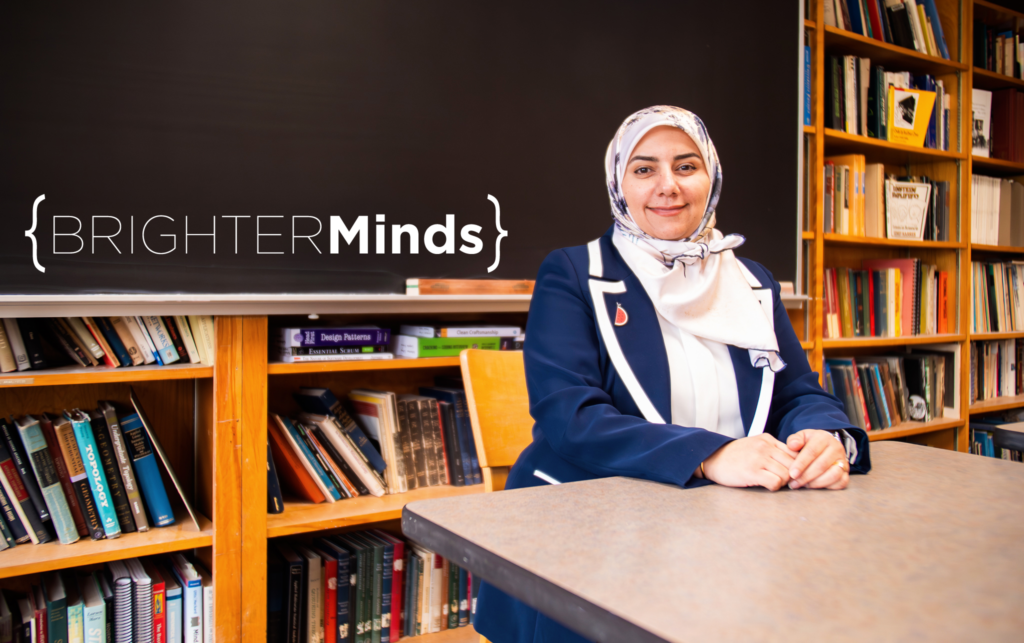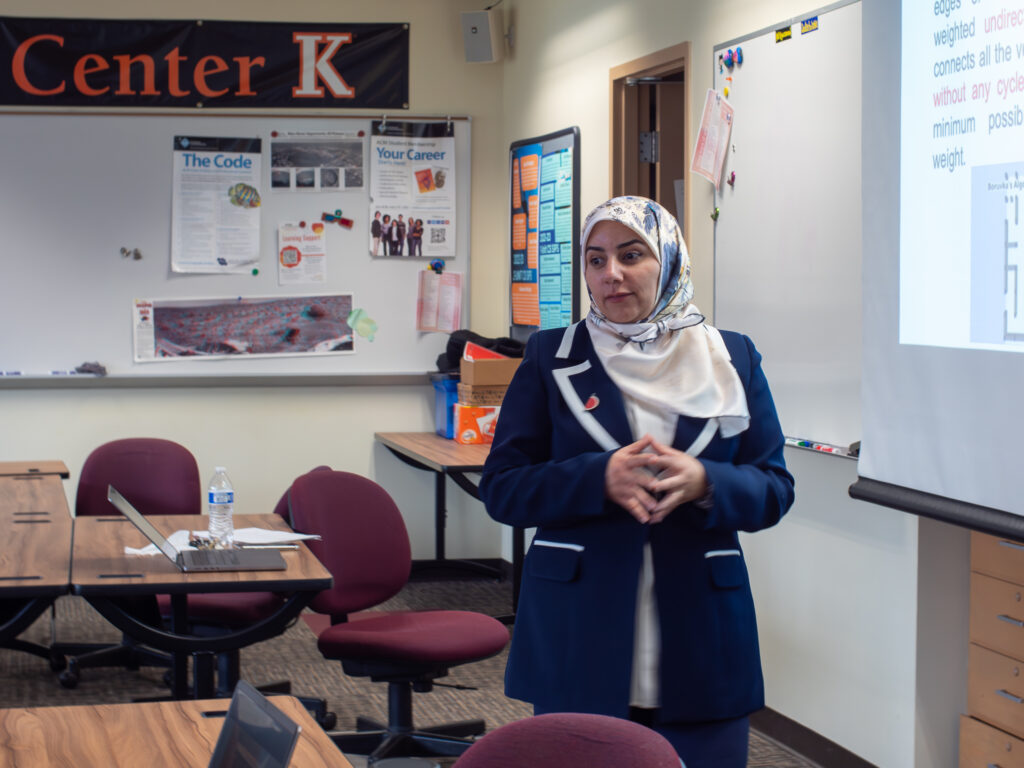
Tasnim Gharaibeh is on a mission to make machine learning accessible to all students
When Tasnim Gharaibeh started teaching at Kalamazoo College, the diversity of majors in some computer science classes—psychology, physics, math, history and religion—surprised her. Yet, she quickly saw that students across departments could handle the work and gain skills applicable to their field of study. In fact, she soon believed that nonmajors could benefit from more advanced courses in her own research area, machine learning.
One aspect of artificial intelligence, machine learning involves providing a computer model with a large enough data set that the computer can be “smart enough—not like a human, but smart enough” to use that previous knowledge to make decisions. For example, researchers can train a model with thousands of images that are labeled “cancer” or “no cancer,” then ask the model to evaluate new images for evidence of cancer.
While computer scientists can and do build models, thousands of models already exist that can be modified or trained to address a new problem or answer a different question, which makes machine learning accessible to a broader audience.
Having developed a course in machine learning for K’s computer science department, Gharaibeh began to consider how to build a machine learning course for nonmajors.
“I want machine learning to be reachable and understandable by any major,” Gharaibeh said. “They need just to know that these models are available. In my Ph.D., I worked with a lot of text, thousands of papers. As a human, I cannot do that, but if you have a machine learning model, you can. So how about the history department? They have a lot of text and books, so they can use machine learning. How about the bio department? How about the psychology department? Computer science now is a language or a tool that is essential in each field.”
Born in the United Arab Emirates, Gharaibeh earned bachelor’s and master’s degrees in computer science in Jordan and taught at a university in Saudi Arabia for seven years before moving to Kalamazoo to complete her Ph.D. in computer science at Western Michigan University. She came to Kalamazoo College in 2022, to fill the newly created Bollinger Assistant Professor of Computer Science endowed position.
Judith ’77 and William Bollinger established the professorship in 2021, as part of the Brighter Light Campaign, in recognition that computer science knowledge and skills are applicable and crucial in nearly every discipline and can benefit every student. At the time, the number of computer science majors had increased tenfold over 10 years, and the department’s offerings were also in great demand from nonmajors.
In the classroom, Gharaibeh’s first priority is establishing an inclusive, welcoming environment—something she herself has not always experienced and she knows firsthand is vital to one’s ability to learn. Gharaibeh encourages students to move around the classroom or computer lab and collaborate, reminding them, “You are not a tree; move!” She brings in guests who use computer science in a variety of jobs to share their experiences with the class.

She also focuses on practical learning—pencil and paper exercises and projects that connect to the real world. As an undergraduate student, she sometimes struggled to see the point of what she was studying. As a professor, Gharaibeh—along with the rest of the computer science department at K—focuses on projects that tackle real-life problems. For example, one class worked to train a model to help people communicate in sign language.
“This is one project that the students love, and me also,” Gharaibeh said. “They have the feeling that they are doing something useful, and in this way, they will see, oh, our studying is productive, practical.”
When students designed their own projects, they surprised Gharaibeh with the depth and professionalism of their results.
“I told them, I have a feeling that I am in a formal, big conference,” she said. “Groups are exchanging details, they are presenting their work, and as a teacher, you know that, oh, they are getting the topic they are learning. They understand what they are talking about.”
The Bollinger Endowed Professorship brought Gharaibeh to K, and with her, opportunities for students to benefit from her expertise in machine learning. The department has now been able to offer its introductory course every term, along with a beginning programming course. Having Gharaibeh help shoulder the load of required computer science courses has increased those offerings and freed up her colleagues in the department to develop courses in their areas of interest.
Sandino Vargas-Pérez, associate professor of computer science, teaches a seminar for students from any department on the ethical use of artificial intelligence.
Pam Cutter, professor of computer science and department chair, developed a first-year seminar, “Exploring Technology for Accessibility,” which engaged a class roughly split between computer science majors and nonmajors for the first time in fall 2023. Cutter also developed a new offering this winter: an interdisciplinary senior seminar, “Generative AI: Concepts, Techniques and Implications,” encouraging students from a range of fields to explore how Generative AI can be—and is being—used to solve problems in their given disciplines, along with the societal and ethical implications of this technology.
Visiting Assistant Professor of Computer Science Nicholas Polanco will offer a new class in cybersecurity. This course will introduce students to the fundamental principles of securing computer systems and networks, with a focus on practical skills and real-world applications. Students will learn about topics such as cryptography, network security, risk assessment, ethical hacking and defense strategies against cyber threats.
The Bollinger Endowed Professorship also made it possible for Gharaibeh to engage with continued education, research and conference participation. Conferences supply vital opportunities to network, collaborate, develop research and stay current in the field, and Gharaibeh is grateful for the financial support provided by the Bollinger Professorship.
“I told the students I’m working with, if we got something published and we need to go to a conference, don’t worry,” Gharaibeh said. “We have this funding here, and so the money will not be something that will not allow you to do publishing. Do the work. The rest will come.”
She is currently working with two students on machine learning research. Involving students in her research offers Gharaibeh time-saving assistance and fresh ideas, while providing students with practical learning, valuable experiences and the possibility of publication.
That kind of win-win relationship has been typical of Gharaibeh’s experience at K, and an opportunity she relishes.
“The environment here is a very supportive environment for students and colleagues,” Gharaibeh said. “I found this very satisfying for me, the relationships among the colleagues. I found the relationships with students very friendly, maybe because the size is small, so you know each student. I have the feeling when I’m teaching, they are listening and open, they just want to learn.”
